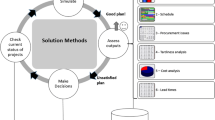Abstract
Solution methods for unexpected temporary shortage of some resources during the execution period of a project are considered in this paper. Mathematical models for getting immediate adjustment to the existing schedule are established. Semi-definite relaxation technique is also applied to these models for some properly large-scale problems. Relationships between the original models and their semi-definite relaxation problems are analyzed. Finally, some preliminary numerical experiments are performed, and the numerical results show that the proposed models are applicable and feasible to solve the temporary resource shortage problem, and the semi-definite relaxation technique is very helpful to get an immediate schedule adjustment for this kind of problem.


Similar content being viewed by others
References
Alba E, Chicano JF (2007) Software project management with Gas. Inf Sci 177(10):2380–2401
Alizadeh F (1995) Interior point methods in semidefinite programming with applications to combinatorial optimization. SIAM J Optim 5:13–51
Blazewicz J, Lenstra JK, RinnooyKan AHG (1983) Scheduling subject to resource constraints: classification and complexity. Discret Appl Math 5:11–24
Blazewicz J, Domschke W, Pesch E (1996) The job shop scheduling problem: conventional and new solution techniques. Eur J Oper Res 93:1–33
Boyd S, Vandenberghe L, Faybusovich L (2005) Convex Optimization. IEEE Trans Autom Control 51(11):1859–1859
Brucher P, Jurisch B, Kramer A (1996) The job-shop problem and immediate selection, no need to indicate this. Ann Oper Res 50:73–114
Brucker P (2002) Scheduling and constraint propagation. Discret Appl Math 123(1–3):227–256
Chen W, Shi YJ, Teng HF, Lan XP, Hu LC (2010) An efficient hybrid algorithm for resource-constrained project scheduling. Inf Sci 180(5):1031–1039
Debels D, Vanhoucke M (2007) A decomposition-based genetic algorithm for the resource-constrained project scheduling problem. Oper Res 55(3):457–469
Faghihi V, Reinschmidt KF, Kang JH (2014) Construction scheduling using genetic algorithm based on building information model. Expert Syst Appl 41(16):7565–7578
Fang C, Wang L (2012) An effective shuffled frog-leaping algorithm for resource-constrained project scheduling problem. Comput Oper Res 39(5):890–901
Goemans MX, Williamson DP (1995) Improved approximation algorithms for maximum cut and satisfiability problems using semidefinite programming. J ACM 42(6):1115–1145
Hartmann S (2002) A self-adapting genetic algorithm for project scheduling under resource constraints. Naval Res Logist 49(5):433–448
Hartmann S, Briskorn D (2010) A survey of variants and extensions of the resource-constrained project scheduling problem. Eur J Oper Res 207:1–14
Hu J, Jiang B, Liu X, Wen Z (2016) A note on semidefinite programming relaxations for polynomial optimization over a single sphere. Sci China Math 59(8):1543–1560
Knyazeva M, Bozhenyuk A, Rozenberg I (2015) Resource-constrained project scheduling approach under fuzzy conditions. Procedia Comput Sci 77:56–64
Lam AYS, Li VOK (2012) Chemical-reaction-inspired metaheuristic for optimization. IEEE Trans Evol Comput 14(3):381–399
Lee T, Mitchell JE (2017) Approximation algorithms from inexact solutions to semidefinite programming relaxations of combinatorial optimization problems. Discret Optim 24:152–169
Leung JY (2004) Handbook of scheduling: algorithms, models, and performance analysis. CRC, Boca Raton
Li H, Womer K, Norman (2015) Solving stochastic resource-constrained project scheduling problems by closed-loop approximate dynamic programming. Eur J Oper Res 246:20–33
Liu Z, Yang L, Deng R, Tian J (2017) An effective approach with feasible spacedecompositionto solve resource-constrained project scheduling problem. Autom Constr 75:1–9
Memos VA, Psannis KE, Ishibashi Y, Kim BG, Gupta BB (2017) An efficient algorithm for media-based surveillance system (eamsus) in iot smart city framework. Future Gener Comput Syst 83:619–628
Mu PC, Nezan JF, Raulet M, Cousin JG (2010) Advanced list scheduling heuristic for task scheduling with communication contention for parallel embedded systems. Sci China Inf Sci 53(11):2272–2286
Pritsker AAB, Watters LJ, Wolfe PM (1969) Multi-project scheduling with limited resources: a zero-one programming approach. Manage Sci 16:93–107
Sturm JF (1999) Using SeDuMi 1.02, a MATLAB toolbox for optimization over symmetric cones. Optim Methods Softw 11(1–4):625–653
Waki H, Kim S, Kojima M et al (2006) Sums of squares and semidefinite program relaxations for polynomial optimization problems with structured sparsity. SIAM J Optim 17(1):218–242
Wolkowicz H, Saigal R, Vandenberghe L (2000) Handbook of semidefinite program-ming, Kluwer Academic Publishers, The Netherlands
Xu B, Yu X, Zhang X, Zhang Z (2014) An SDP randomized approximation algorithm for max hypergraph cut with limited unbalance. Sci China Math 57(12):2437–2462
Yannibelli V, Amandi A (2013) Hybridizing a multi-objective simulated annealing algorithm with a multi-objective evolutionary algorithm to solve a multi-objective project scheduling problem. Expert Syst Appl 40(7):2421–2434
Zhang F (2005) The Schur complement and its applications. Springer, US
Acknowledgements
The authors would like to express their appreciation to the Natural Science Foundation of China for the financial support to this paper (Grant No. 71471007).
Author information
Authors and Affiliations
Corresponding authors
Additional information
Publisher’s Note
Springer Nature remains neutral with regard to jurisdictional claims in published maps and institutional affiliations.
Rights and permissions
About this article
Cite this article
Zhang, J., Zhao, J. & Zhou, H. Immediate schedule adjustment models and their semi-definite relaxation in project scheduling with temporary resource shortage. J Ambient Intell Human Comput 10, 3075–3081 (2019). https://doi.org/10.1007/s12652-018-0816-1
Received:
Accepted:
Published:
Issue Date:
DOI: https://doi.org/10.1007/s12652-018-0816-1




